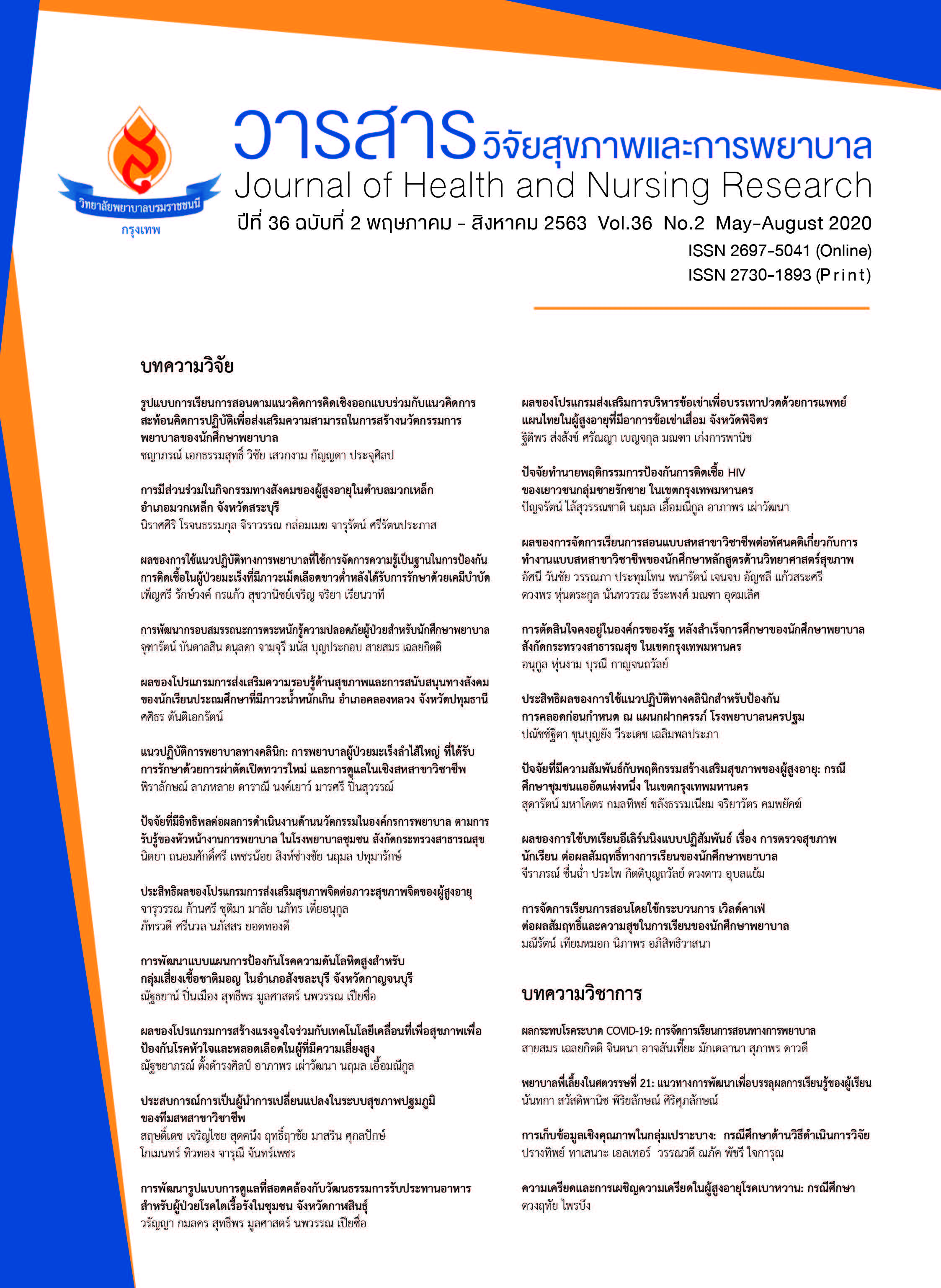การพัฒนารูปแบบการดูแลที่สอดคล้องกับวัฒนธรรมการรับประทานอาหาร สำหรับผู้ป่วยโรคไตเรื้อรังในชุมชน จังหวัดกาฬสินธุ์
คำสำคัญ:
รูปแบบการดูแล, วัฒนธรรมการรับประทานอาหาร, โรคไตเรื้อรังบทคัดย่อ
การวิจัยและพัฒนา มีวัตถุประสงค์เพื่อ 1) ศึกษาวัฒนธรรมการรับประทานอาหารและปัจจัยที่มีความสัมพันธ์กับวัฒนธรรมการรับประทานอาหารของผู้ป่วยโรคไตเรื้อรัง 2) พัฒนารูปแบบการดูแลที่สอดคล้องกับวัฒนธรรมการรับประทานอาหารสำหรับผู้ป่วยโรคไตเรื้อรัง 3) ศึกษาประสิทธิผลของรูปแบบการดูแลที่สอดคล้องกับวัฒนธรรมการรับประทานอาหารสำหรับผู้ป่วยโรคไตเรื้อรังที่พัฒนาขึ้น
กลุ่มตัวอย่างแบ่งตามระยะการพัฒนารูปแบบ ได้แก่ ระยะที่ 1 การศึกษาวัฒนธรรมการรับประทานอาหารและปัจจัยที่มีความสัมพันธ์กับวัฒนธรรมการรับประทานอาหาร กลุ่มตัวอย่างเป็นผู้ป่วยโรคไตเรื้อรังและผู้ดูแล จำนวน 27 คน ระยะที่ 2 การพัฒนารูปแบบ ฯ กลุ่มตัวอย่างเป็นทีมพัฒนารูปแบบ จำนวน 12 คน และระยะที่ 3 การศึกษาประสิทธิผลของการใช้รูปแบบ ฯ ที่พัฒนาขึ้น กลุ่มตัวอย่างเป็นผู้ป่วยโรคไตเรื้อรัง จำนวน 15 คน และประชาชนในชุมชน จำนวน 80 คน เครื่องมือการวิจัย ได้แก่ 1) แนวคำถามการสนทนากลุ่มสำหรับผู้ป่วยโรคไตเรื้อรังและผู้ดูแล 2) แนวทางการระดมสมองเพื่อพัฒนารูปแบบการดูแลที่สอดคล้องกับวัฒนธรรมการรับประทานอาหารสำหรับผู้ป่วยโรคไตเรื้อรังในชุมชน 3) แบบสอบถามพฤติกรรมการรับประทานอาหารของผู้ป่วยโรคไตเรื้อรัง ซึ่งมีค่าดัชนีความตรงเชิงเนื้อหาอยู่ระหว่าง .80-1.00 และค่าสัมประสิทธิ์แอลฟาครอนบาค เท่ากับ .92 และ 4) แบบสอบถามความพึงพอใจของประชาชนในชุมชน วิเคราะห์ข้อมูลเชิงปริมาณโดยใช้สถิติพรรณนาและสถิติการทดสอบวิลคอกซัน ไซน์ แมทแพร์แรงค์ และข้อมูลเชิงคุณภาพโดยการวิเคราะห์เนื้อหผลการวิจัยพบว่า 1) ผู้ป่วยโรคไตเรื้อรังมีแบบแผนการรับประทานอาหารหลักคือการรับประทานข้าวเหนียวและปลาน้ำจืด โดยไม่จำกัดปริมาณ มักปรุงรสอาหารด้วยปลาร้า เกลือ และผงชูรส ปัจจัยที่มีความสัมพันธ์กับแบบแผน ได้แก่ การโฆษณาชวนเชื่อทางวิทยุให้รับประทานอาหาร ยาสมุนไพร ความเชื่อว่าการดื่มสุราจะช่วยล้างไตให้สะอาดและให้ดื่มในช่วงเทศกาลเข้าพรรษา ในงานประเพณีของชุมชนมักมีอาหารรสจัดและใช้เครื่องปรุงรส และประชาชนใช้บัตรสวัสดิการแห่งรัฐซื้อเครื่องปรุงรสได้ง่ายขึ้น 2) รูปแบบการดูแลที่สอดคล้องกับวัฒนธรรมการรับประทานอาหารสำหรับผู้ป่วยโรคไตเรื้อรังในชุมชน ประกอบด้วย (1) การอนุรักษ์วัฒนธรรมการปรุงอาหารรับประทานเองและอาหารข้าว ปลา และผัก โดยการเยี่ยมบ้าน ส่งเสริมการปลูกพืชผักผลไม้ และการพัฒนาให้เป็นหมู่บ้านต้นแบบรักษ์ไต (2) การต่อรองการจำกัดปริมาณอาหารและเครื่องปรุงรส โดยให้ความรู้ ใช้นวัตกรรมวงล้ออาหารและกระติบข้าวเหนียวรักษ์ไต และผูกเสี่ยวรักษ์ไต (3) การจัดรูปแบบใหม่ให้เลิกดื่มสุรา โดยการเยี่ยมบ้านร่วมกับชุมชน และ 3) การใช้รูปแบบการดูแลที่พัฒนาขึ้นทำให้พฤติกรรมการรับประทานอาหารของผู้ป่วยโรคไตเรื้อรังดีกว่าก่อนใช้รูปแบบอย่างมีนัยสำคัญทางสถิติที่ระดับ .05 และประชาชนมีความพึงพอใจต่อรูปแบบที่พัฒนาขึ้นในระดับมาก
Downloads
เอกสารอ้างอิง
2. Bureau of Non Communicable Disease. Manual action to reduce CKD in diabetic patients and hypertension. Nonthaburi: War Veterans Organization Officer of Printing Mill; 2015.
3. Trakarnvanich TH, Sirimongkolchaiyakul O. Manual for people How to not kidney failure. The Nephrology Society of Thailand. Bangkok: bnsadvance; 2016.4. Health Center Information System Kalasin. Kalasin provincial public health office. significant illness with non-communicable diseases. [Internet]. 2019 [cited 2019 Apr 20]. Available from https://ksn. hdc.moph.go.th/hdc/main/index_pk.php.
5. Report non-communicable diseases. LaoLuang district health promotion hospital, Kalasin province. Summary of chronic non-communicable diseases report, 2019.
6. Thamwat J. Northeastern wisdom. Maha Sarakham: Faculty of Humanities and Social Sciences Project. Maha Sarakham University. 2000.
7. Buahaphakdi A. Pickled fish fermented fish food Identity in the ASEAN Community. Journal Culture 2019;58(2):99-103. (in Thai).
8. Positioning Magazine Online. Pickled fish products: business with annual output of over 20 million baht. [Internet]. 2004 [cited 2019 Apr 20]. Available from https://positioningmag.com/17073.
9. Thaipost.net. Thai fermented fish hit the market, making 800 million a year. [Internet]. 2018 [cited 2019 Apr 20]. Available from https://www.thaipost.net/main/detail/7454.
10. Ruaisungnoen W, Saensom D, Methakanjanasak N, Daenseekaew S, Chaiyapoom N, Khanthamoon R, et.al. High sodium consumption situation and perception relevant to high sodium consumption associated with chronic kidney disease among people with chronic non-communicable disease. Journal of Nursing and Health Care 2018;36(3):242-50. (in Thai).
11. Prakeetavatin J, Moolsart S, Tipkanjanaraykha K. The development of a care management model for hypertension patients with chronic kidney disease in a community. Journal of Boromarajonani College of Nursing, Bangkok 2018;34(1):1-13. (in Thai).
12. Moolsart S, Nuysri M. Theoretical concepts in nursing care for clients with chronic disease in community in collection of nursing information for chronic disease patients in the community (Unit 3, p 1-52). Nonthaburi: Sukhothai Thammathirat Open University; 2019. (in Thai).
13. Manklang R. Innovation in taking care for patients with chronic kidney disease based on community integration and community participation [doctoral’s thesis]. Rajabhat Maha Sarakham University; 2017. (in Thai).
14. Tuptim N, Chanarong K, Patharamutha M, Suklek P, Wiriyasumon S. A study of connection of dining cultures between Phitsanulok and ASEAN. Journal of Community Development Research (Humanities and Social Sciences) 2017;(4):47-61. (in Thai).
15. Moolsart S, Potjanamart C, Thaworn N. Management of patient care for chronic non-communicable diseases in multicultural communities along the northern border of Thailand. Journal of Public Health Nursing 2017;31(3):145-62. (in Thai).
16. Tangkiatkumjai M. How to use herbs and supplements to be safe in patients with kidney disease. Faculty of Pharmacy Srinakharinwirot University. [Internet]. 2018 [cited 2019 Apr 20]. Available from https://bit.ly/373vIDG
17. Serewiwattana M, Thongtanunam Y, Limakara S. Development of quality care for delaying progression of kidney disease in chronic patients using the chronic care model of a sub-district health promotion hospital. Thai Journal of Nursing and Midwifery Practice 2018;5(1):45-56. (in Thai).
18. Singhkum S. The development of chronic renal failure patient treatment program in community by motivating the coordinator network participation Kaedam district. Mahasarakham Hospital Journal 2016;13(3):92-9. (in Thai).
19. Khottasang S. Nongkungsri hospital help group mellow weave happiness application of tradition bind help group: New perspectives on diabetes care. Nonthaburi: Health Systems Research Institute; 2008.
20. Sukdee S, Intarakamhaeng U, Duangchan P. The development of health behavior modification model in non-communicable chronic diseases risk by using participatory approach in knowledge management of the community in Tambon Bangklua, Chachoengsao province. Journal of Health Education 2017;40(1):38-52. (in Thai).
21. Juntachat A, Meepan M, Jabprapai P. The development of the self-management program for diabetes mellitus patients with third stage chronic kidney disease. Journal of Preventive Medicine Association of Thailand 2017;7(3):280-91. (in Thai).
22. Chomchuen C. Effects of spouse support on protein consumption behavior, blood urea nitrogen and creatinine of patients with chronic kidney disease. [thesis] Chon Buri: Burapha University. 2013. (in Thai).
23. Meuleman Y, Ten Brinke L, Kwakernaak AJ, Vogt L, Rotmans JI, Bos WJW, et al. Perceived barriers and support strategies for reducing sodium intake in patients with chronic kidney disease: a qualitative study. International Journal of Behavioral Medicine 2015;22(4):530-9.
24. Namdang District Health Promotion Hospital, Chachoengsao Province. “innovation Kidney delay wheel” [Internet]. 2018 [cited 2019 Apr 20]. Available from http://www.govesite.com/uploads/ 201711141629296GZPjVx/20180618032420_1_mP15ctR.pdf
25. Chanprakhon C. Effects of empowerment based self-management support program on self-management Behaviors and Clinical Indicators among patients with diabetic Nephropathy [thesis] Khon Kaen: An Independent Study Report for the Master of Nursing Science in Adult Nursing, Faculty of Nursing, Khon Kaen University; 2013. (in Thai)
ดาวน์โหลด
เผยแพร่แล้ว
รูปแบบการอ้างอิง
ฉบับ
ประเภทบทความ
สัญญาอนุญาต
บทความที่ได้รับการตีพิมพ์ เป็นลิขสิทธิ์ของวารสารวิจัยสุขภาพและการพยาบาล (วิทยาลัยพยาบาลบรมราชชนนี กรุงเทพ) ไม่สามารถนำไปตีพิมพ์ซ้ำในวารสารฉบับอื่น


















